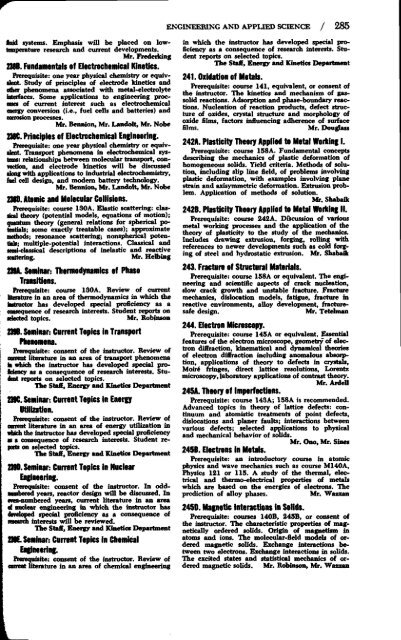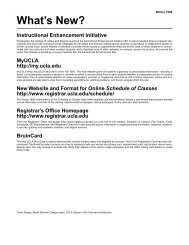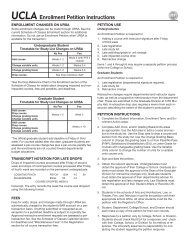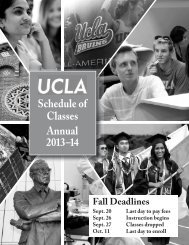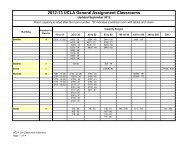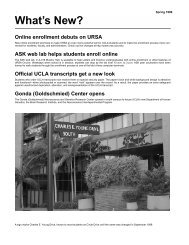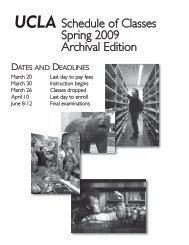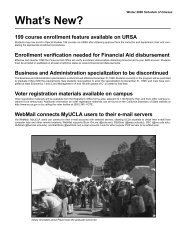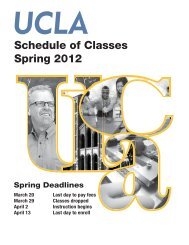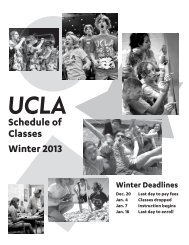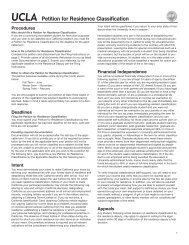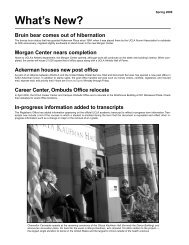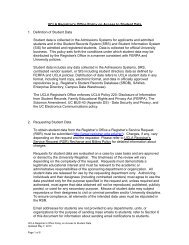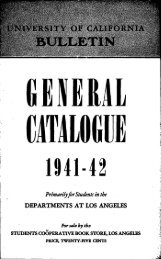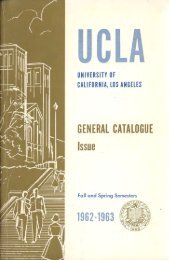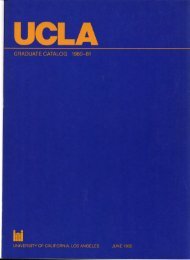UCLA General Catalog 1971-72 - Registrar - UCLA
UCLA General Catalog 1971-72 - Registrar - UCLA
UCLA General Catalog 1971-72 - Registrar - UCLA
Create successful ePaper yourself
Turn your PDF publications into a flip-book with our unique Google optimized e-Paper software.
ENGINEERING AND APPLIED SCIENCE / 285<br />
said systems. Emphasis will be placed on lowtemperature<br />
research and current developments.<br />
Mr. Frederking<br />
in which the instructor has developed special proficiency<br />
as a consequence of research interests. Student<br />
reports on selected topics.<br />
2388. Fundamentals of Electrochemical Kinetics.<br />
The Staff, Energy and Kinetics Department<br />
Prerequisite : one year physical chemistry or equivslent<br />
Study of principles of electrode kinetics and<br />
outer phenomena associated with metal-electrolyte<br />
interfaces. Some applications to engineering proceas<br />
of current interest such as electrochemical<br />
energy conversion (i.e., fuel cells and batteries) and<br />
corrosion processes.<br />
Mr. Reunion, Mr. Landolt, Mr. Nobe<br />
241. Oxidation of Metals.<br />
Prerequisite: course 141, equivalent , or consent of<br />
the instructor. The kinetics and mechanism of gassolid<br />
reactions . Adsorption and phase-boundary reactions.<br />
Nucleation of reaction products, defect structure<br />
of oxides , crystal structure and morphology of<br />
oxide films, factors influencing adherence of surface<br />
films. Mr. Douglass<br />
2380. Principles of Electrochemical Engineering.<br />
Prerequisite: one year physical chemistry or equivdent.<br />
Transport phenomena in electrochemical systems:<br />
relationships between molecular transport, convection,<br />
and electrode kinetics will be discussed<br />
dung with applications to industrial electrochemistry,<br />
fuel cell design , and modem battery technology.<br />
Mr. Reunion , Mr. Landolt , Mr. Nobe<br />
2388. Atomic and Molecular Collisions.<br />
242A. Plasticity Theory Applied to Metal Working I.<br />
Prerequisite : course 158A . Fundamental concepts<br />
describing the mechanics of plastic deformation of<br />
homogeneous solids . Yield criteria. Methods of solution,<br />
including slip line field, of problems involving<br />
plastic deformation , with examples involving plane<br />
strain and axisymmetric deformation . Extrusion problem.<br />
Application of methods of solution.<br />
Mr. Shabalk<br />
Prerequisite: course 130A . Elastic scattering: classical<br />
theory (potential models , equations of motion);<br />
quantum theory (general relations for spherical potentials;<br />
some exactly treatable cases ); approximate<br />
methods; resonance scattering ; nonspherical potentids;<br />
multiple-potential interactions . Classical and<br />
semi-classical descriptions of inelastic and reactive<br />
scattering. Mr. Helbing<br />
2428. Plasticity Theory Applied to Metal Working II.<br />
Prerequisite : course 242A . Discussion of various<br />
metal working processes and the application of the<br />
theory of plasticity to the study of the mechanics.<br />
Includes drawing extrusion, forging, rolling with<br />
references to newer developments such as cold forging<br />
of steel and hydrostatic extrusion. Mr. Shabalk<br />
2388. Seminar : Thermodynamics of Phase<br />
Transitions.<br />
243. Fracture of Structural Materials.<br />
Prerequisite : course 158A or equivalent. The engineering<br />
and scientific aspects of crack nucleation,<br />
Prerequisite: course 130A . Review of current<br />
literature in an area of thermodynamics in which the<br />
imlructor has developed special proficiency as a<br />
consequence of research interests . Student reports on<br />
selected topics. Mr. Robinson<br />
2388. Seminar : Current Topics in Transport<br />
Phenomena.<br />
Prerequisite: consent of the instructor. Review of<br />
arrant literature in an area of transport phenomena<br />
in which the instructor has developed special proisfency<br />
as a consequence of research interests. Studect<br />
reports on selected topics.<br />
The Staff, Energy and Kinetics Department<br />
2386. Seminar : Current Topics In Energy<br />
Utilization.<br />
Prerequisite: consent of the instructor. Review of<br />
arrcnt literature in an area of energy utilization in<br />
which the instructor has developed special proficiency<br />
as a consequence of research interests . Student reports<br />
on selected topics.<br />
The Staff, Energy and Kinetics Department<br />
slow crack growth and unstable fracture. Fracture<br />
mechanics , dislocation models, fatigue, fracture in<br />
reactive environments , alloy development , fracturesafe<br />
design . Mr. Tetelman<br />
244. Electron Microscopy.<br />
Prerequisite : course 145A or equivalent . Essential<br />
features of the electron microscope, geometry of electron<br />
diffraction, kinematical and dynamical theories<br />
of electron diffraction including anomalous absorption,<br />
applications of theory to defects in crystals,<br />
Moire fringes, direct lattice resolutions, Lorentz<br />
microscopy , laboratory applications of contrast theory.<br />
Mr. Arden<br />
245A. Theory of Imperfections.<br />
Prerequisite : course 143A ; 158A is recommended.<br />
Advanced topics in theory of lattice defects: continuum<br />
and atomistic treatments of point defects,<br />
dislocations and planer faults ; interactions between<br />
various defects ; selected applications to physical<br />
and mechanical behavior of solids.<br />
Mr. Ono, Mr. Sines<br />
2458. Electrons In Metals.<br />
Prerequisite : an introductory course in atomic<br />
2390. Seminar : Current Topics in Nuclear<br />
Engineering.<br />
Prerequisite: consent of the instructor. In oddaaobered<br />
years, reactor design will be discussed. In<br />
even-numbered years, current literature in an area<br />
of nuclear engineering in which the instructor has<br />
developed special proficiency as a consequence of<br />
march interests will be reviewed.<br />
The Staff, Energy and Kinetics Department<br />
238E. Seminar : Current Topics in Chemical<br />
E gineering.<br />
physics and wave mechanics such as course M140A,<br />
Physics 121 or 115. A study of the thermal, electrical<br />
and thermo-electrical properties of metals<br />
which are based on the energies of electrons. The<br />
prediction of alloy phases . Mr. Wazzan<br />
2450. Magnetic Interactions in Solids.<br />
Prerequisite : courses 1408, 245B, or consent of<br />
the instructor. The characteristic properties of magnetically<br />
ordered solids . Origin of magnetism in<br />
atoms and ions. The molecular -field models of ordered<br />
magnetic solids . Exchange interactions between<br />
two electrons . Exchange interactions in solids.<br />
Prerequisite: consent of the instructor . Review of<br />
ascent literature in an area of chemical engineering<br />
The excited states and statistical mechanics of ordered<br />
magnetic solids . Mr. Robinson, Mr. Wazzan


